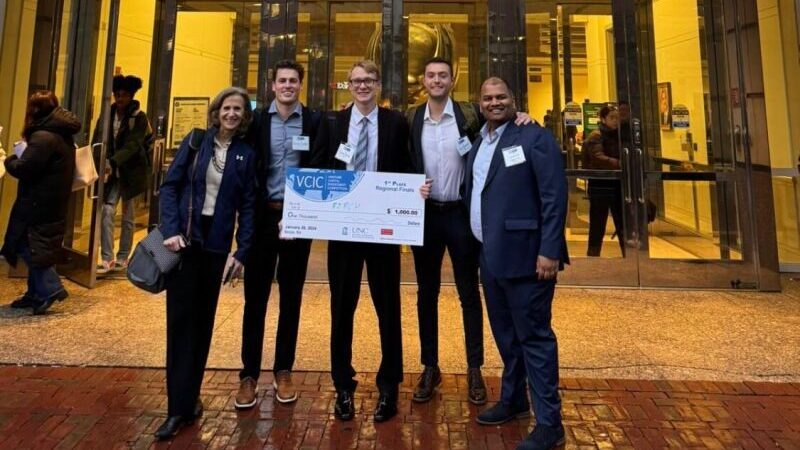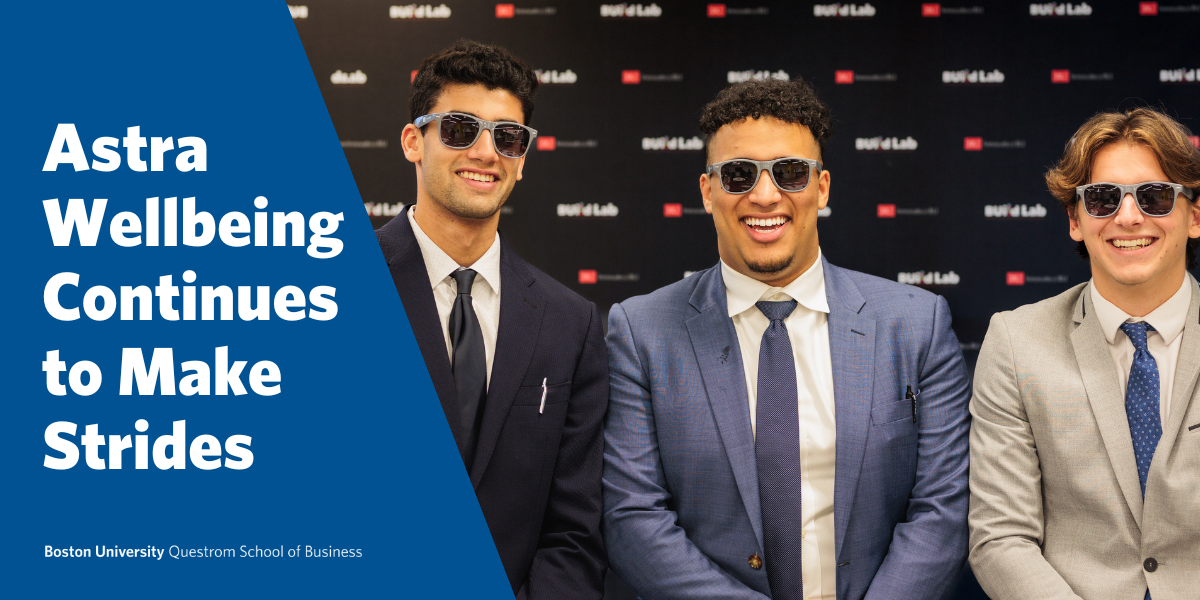GMAC: The MBA Tour – San Francisco
Saturday, July 13
11:00 AM
In the Full-Time MBA, you’ll take core courses and plenty of electives. And put what you learn to the test with a real organization in an internship and a capstone project. You’ll take electives in your first year, with the flexibility to make your course of study as broad or as deep as you’d like. If you choose, you could focus your degree in the Health Sector or Social Impact, or earn two degrees at one time with our MBA+ MS in Digital Technology. And then there are Learning Communities, global immersion courses, and specific Career Pathways. Our aim is to give you plenty of room to explore and customize. The choice is yours.
2 Weeks
During the program Launch, you’ll get started right away with Ethics, learning frameworks that will guide your perspective as you continue in the curriculum.
Your first semester is divided into two 7-week modules.
7 weeks
In Module 1, you’ll delve into economics, accounting, and organizational behavior. At the end of the first module, you’ll apply your new knowledge and teaming skills as you evaluate a company as a possible takeover target within a sector.
COURSE CODE: MO713
This course introduces concepts, models and frameworks to help you become better managers of the organizations you work for, the teams you work in, the people you work with and your own professional development. Emphasis will be on behavioral science concepts and research findings related to the major challenge managers face — how to organize individuals in order to fulfill the objectives and strategies of the firm. Topics that will be examined include: the nature and dynamics of the organization (organizational structure and culture, performance systems and metrics, reward systems, selection and socialization); the elements of individual leadership and personal development (power, decision-making, emotional intelligence, career development, developmental needs, feedback, and mentoring and coaching); managing change within organizational contexts (the dynamics and stages of organizational change and the skills and tactics employed by change agents); and the relationships between the firm and the external environment in which it operates. The course objective is to provide analytical skills and strategies, substantive knowledge, and a professional sensibility that will increase your ability to take effective action.
COURSE CODE: ac710
An introduction to financial accounting and how organizations provide financial information to external users (stockholders, creditors, and analysts). The focus is on understanding the impact of business activities and accounting choices on financial statements, and analyzing financial statements to infer the business activities undertaken. Topics covered include income statement and balance sheet format, purposes, and limitations; statement of cash flows; and analysis of the impact of different business models on financial performance.
COURSE CODE: pl727
Understanding and analyzing the core strategic decisions facing businesses in competitive markets. Students will examine how businesses achieve their fundamental goals given the need to produce goods and services efficiently and a market environment reflecting consumer preferences (demand) and the strategies and strengths of competitors. Students will develop analytic skills necessary for understanding core business models and how different models create value for the business as well as the larger society.
7 weeks
Module 2 introduces you to marketing, business analytics, and finance, as well as leadership communications. You’ll polish your presentation skills in our own version of the TED Talk, a “QuestromTalk”! The module ends with a team-based business simulation.
COURSE CODE: mk723
This course provides a practical understanding of how business strategies and tactics are driven by marketing’s dual focus on customers and competition. Students will learn how to leverage marketing tools and emerging technologies in the creation (e.g., customer insight, product and service design, branding), delivery (e.g., communication and distribution), and capture (e.g., pricing, customer life time value) of marketplace value. Across business contexts including B2C, B2B, products versus services, global versus domestic markets, small/medium/large organizations, for-profit versus social enterprises, the course builds the fundamental skills involved in analyzing market challenges and opportunities and making decisions for the formulation and implementation of successful and sustainable marketing programs.
COURSE CODE: qm716
The overall goal of this course is to improve student ability to learn from data, specifically to 1) assess the validity of conclusions that have been drawn from statistical analyses; 2) recognize the extent to which variation characterizes products and processes, and understand the implications of variation on organizational decisions when interpreting data; and 3) portray, summarize and analyze data to support operational and strategic decisions associated with the core business models. Students will increase their understanding of the use of probabilities to reflect uncertainty; how to interpret data in light of uncertainty to assess risk; and how to build and interpret regression models, which can be used to inform core business and organizational decisions.
COURSE CODE: fe711
This course begins by briefly introducing students to some fundamental concepts in financial theory, including the separation of investment, cash flow, and consumption decisions for firms; the time-value of money, net present value, and the associated impetus towards value-based decision making; as well as arbitrage and the law of one price, and the idea of efficient markets. Students will then dig deeper into the mechanics of discounting, compounding, and calculating free cash flows, giving them tools to make value-based decisions about whether to undertake or cancel a project within a firm; value a share, or acquire a company, using a given discount rate.
14 Weeks
During the spring term, you’ll take semester-long courses in operations management, innovation and strategy, as well as options for 7-week or semester-long finance courses—go as deep as you want. In addition, now’s the time to round out the strong business foundation you’ve built with electives that spark your interest—maybe Branding, Negotiations, or Analytics for Managers. There are 100+ electives to choose from. During this semester, you’ll also put your new skills to work in an integrative capstone project with a real company—past clients include IBM, GSK, Wayfair, and the City of Boston.
COURSE CODE: fe712
COURSE CODE: si750
"Competition, Innovation, and Strategy" is an integrative course designed to capitalize on your understanding of Finance, Operations Management, Marketing, and other functional issues. The course draws on a number of academic disciplines, especially economics, organization theory, and sociology, to build a fundamental understanding of how and why some firms achieve and sustain superior performance. We also study why some firms persistently generate returns that are lower than average. The course is analytically focused and requires that you evaluate both the external environment and the internal capabilities of organizations. Corporate diversification and global management are important topics that are also featured.
COURSE CODE: om725
This MBA core course is case-oriented and focuses on topics of use to managers in any environment: process analysis, process improvement, supply chain management, and strategic operations decision-making. The course emphasizes the importance of effectiveness and efficiency and evaluates the potential trade-offs between them.
In addition to the above, students will take courses in Leadership Communications (1.5 credits), Team Coaching (0.5 credits), and Career Management (O credits).
2 Semesters
Your second year is also semester-based. Most students take five three-credit electives each semester. Kick off the year with an intensive course in managing risk and follow it up with more electives. At the same time, you might even broaden your horizons and pack your bag for a global immersion course here.
At least 3 credits of elective coursework must qualify as an Action Learning Course. These can be taken in either the first or second year of the program.
Create a curriculum for the degree you want. Whether it’s building on your existing talents or exploring a new business area, MBA career pathways allow you to mix and match electives to reach your individual career goals. Travel your own path!

Ready to gain hands-on experience and make a difference? Apply what you learn in the classroom to work in the real world right away—creating positive outcomes while you’re still a student. It’s the ultimate bridge between theory and practice, preparing you for success beyond the classroom.
In many courses, you’ll use actual data sets and scenarios to solve real problems, giving you the experiences you’ll need to hit the ground running when you graduate. Examples include:
“The challenges highlighted specifically in the action learning project included limited resource allocation, organizational structure and potential forms of the way a social impact business can be organized, the necessity to stay adaptable to change, and more. Most importantly, it highlighted an utterly important issue – how to achieve and measure the social impact KPI’s, and at the same time stay profitable. This insight has equipped me with a nuanced perspective on the intricacies involved in implementing strategies within the unique context of the social sector. “
~Marek Michalakd Calderon-Guthe
Full-time Social Impact MBA
Strategy Implementation SI859
COURSE CODE: MK854
This is a course about branding, and the ways that brands acquire and sustain value in the marketplace. Cases, readings, in-class discussions, and team/individual assignments are designed to provide: An appreciation of the strategic discipline of branding and its role in creating shareholder value; an understanding of brands as co-creations of consumers, marketers, and cultures, and brand management as a collaborative process of meaning management; a sound foundation in consumer-brand behavior to inform brand decisions; and a capacity to think creatively and precisely about the strategies and tactics involved in building, leveraging, defending, and sustaining strong brands. Select topics may include brand equity, brand (re)positioning, brand relationships, brand loyalty, brand community, open source branding, branded entertainment and other cultural branding strategies, internal branding, brand architecture design and portfolio strategy, brand leverage and extensions, brand metrics, crisis management, and brand stewardship. A team-based brand planning project or series of data-driven applications weaves content throughout the course and, when possible, involves a live client problem. Guest speakers from branding services, consulting, and practice provide insights throughout the course. While this course has obvious relevance for those contemplating brand management careers in product or service markets, it is appropriate for a range of future professionals within for-profit and not-for-profit C2C and B2B worlds, and others who share a simple passion for branding.
COURSE CODE: SI859
Gain the skills and know-how to manage up and across your organization, passing the normal organizational tests along the way from technical expert to cross-functional integrator to directing the future course of your organization. This is strategy implementation for the middle manager who needs to 1) size-up the situation and 2) determine how to gain the power needed to achieve their objectives. One of the qualitative factors that will be explored in great detail is personal style choice vis à vis different stakeholders and organizational politics and the resultant perceptions of you and your programs. Students will study both successful and less-successful managers through cases and readings, honing their own, personal managerial style.
COURSE CODE: SI860
COURSE CODE: IS827
To thrive in modern economies, managers, entrepreneurs and investors need a thorough understanding of business platforms. Thousands of firms, from Facebook to Salesforce, now operate as open ecosystems that match buyers and sellers, gain value and market share from network effects, and harness their users to innovate. Drawing on cases from social media, entrepreneurship, enterprise software, mobile services, healthcare, and consumer products, students will analyze and learn to negotiate platform startup, convert existing businesses, and make vital decisions on issues of openness, cannibalization, and competition. Students will interact with execs of major firms such as Cisco and SAP and with startups. They will learn to apply concepts from two sided networks, industrial organization, information asymmetry, pricing, intellectual property, and game theory to real problems. Known worldwide for his work on network business models, Professor Van Alstyne provides students with the tools to leverage key principles into hands-on creation and management of real-world platforms.
COURSE CODE: HM840
Students enrolled in this course will be divided into teams of 3-4 students during the first class. Each team will be assigned a business development/strategy/marketing consulting project for a local, regional, national, or international health sector organization. These projects have been requested by these organizations; the organizations are covering all expenses associated with the projects and anticipate receiving a consulting report from the student team at the end of the semester. The deliverables for this assignment are the consulting report as well as a 30 minute in-class presentation followed by a 10 minute question-and-answer period. The team may also be asked by the organization to make a presentation to the organization’s management. These projects constitute a way to apply what you are learning in the MBA program to a real health sector management situation; an opportunity to gain experience and broaden your familiarity with health sector organizations with which you have had little or no direct experience; a way for local, regional, and national health sector organizations to benefit from your expertise and hard work in solving a management problem; and a continuing linkage of the Boston University MBA and Health Care Management Programs to the health sector community.
During the 2022-2023 academic year, 20 Questrom MBA teams competed in case competitions. Here are a few highlights.
20+ teams from 6 world regions tackling tough business and ethics questions provide a forum for students and executives worldwide to discuss, debate, and analyze the merits of international business and its intersection with ethics. The winning team from each region received $10,000 to travel to the final in Southeast Asia.
Each year, participants form, storm, norm, and perform over just 7 days. This year’s challenge tasked teams with determining strategic direction and increasing global recognition of local restaurant Shaking Crab as it faces high operating and labor costs. This is a slightly different type of case competition because the judges and mentors are not just executives but consultants and hiring managers with the boutique firms sponsoring the competition.

The New Venture Competition awards $72,000 in prizes to early-stage BU entrepreneurs and helps them transform their ideas into something real.

Students play the role of VCs who have $100MM to invest in one of the presenting startups. Teams pitch an investment strategy to the VC judges.

With support from BU’s Build Lab, Questrom students received 1st place in BU’s $50k SHA Hospitality Innovation Competition, winning $25,000 and $10,000 in the BU $72k New Venture Competition.
If you’re ready to get a global perspective, maybe a global immersion course is in your future. These full-semester electives let you earn credit while collaborating with an international company or organization on a consulting project. During spring break, you’ll travel to the host country to explore the business modules of other cultures, meet global managers and CEOs, and gain invaluable social and cultural understanding. Destinations and topics change from year to year. Here are a few of our recent trips.

In Milan, learning about luxury means living it. Dive into the Luxury Business Global Immersion course led by Professor Hambrick, where we‘re not just studying—we’re creating lasting memories in the city of style.

How do organizations develop innovative products and services that act as sustainable solutions to social challenges? Students tackle these issues by doing a consulting project for a client from a host country and then present their recommendation to the client in person. Recent locations include Brazil and South Africa.
Have you ever dreamed of climbing the Great Wall of China? How about consulting to a Chinese firm in Beijing? This MBA course involves consulting work with a trip to Asia to deliver the team’s recommendation personally to the client at their offices. Much of the past students’ work over the years has both been implemented and widely published in the Chinese business press. It’s an exciting, rigorous, team-based project that students have parlayed into jobs, both domestically and internationally, in strategy consulting.
Following the theme of Global Strategic Effectiveness, students do a deep dive on the cultural underpinnings that affect doing business in so many of these different locations. During the Field Study, you’ll meet with different companies in Asia with plenty of time for sightseeing.
Ready to apply? Once you’ve submitted your materials, we’ll start the review process. We’re happy to answer your questions along the way.
The following deadlines are for Fall 2024 entry.
*Priority Deadline